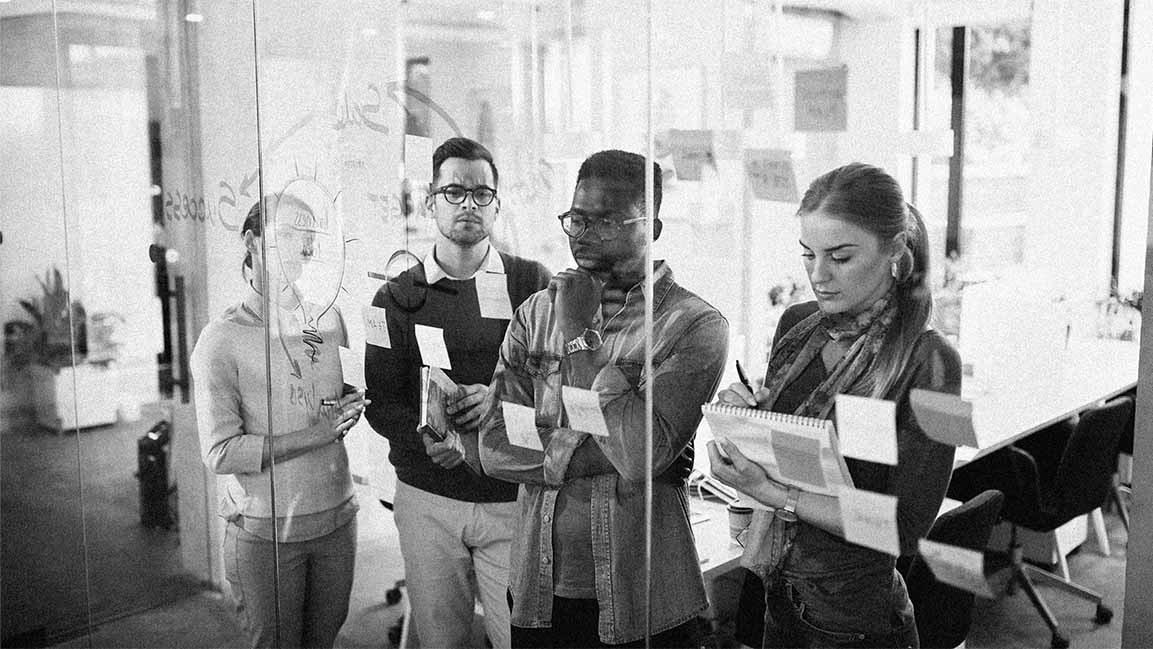- | 8:00 am
A futurist’s ultimate guide to how AI is going to change work forever
Frank Diana, principal futurist at Tata Consultancy Services breaks down four ways AI will change the way we work.

Strikes and unions are growing in prominence. The economic and geopolitical climate is uncertain. Employees across industries are demanding better conditions and pay. And new technologies are poised to transform how we work.
All of these trends are happening right now, but they also happened 100 years ago.
In the early 20th century, a complex political and economic environment, along with worker hardships, resulted in a new era of innovation, productivity, and worker satisfaction. It was a revolution in not just how, but why we work.
As a futurist, I study the context of business, societal, and economic evolution. And it appears that these same signs point to another upcoming revolution that will change our way of working. I also think these changes will happen in similar, positive, and employee-centric ways. In the same way assembly lines made jobs safer and easier a century ago, I believe artificial intelligence (AI) will lead to a fundamental yet positive change in how workers engage in labor. Here is my guide to four of these changes.
THE 40-HOUR WORKWEEK WILL BE TRANSFORMED
First, work will focus more on the skills and needs that are unique to an industry, while the underlying administration, maintenance, and other general tasks are taken over by AI. Imagine a teacher that can focus more on educating children and less on grading papers. The reduction of more menial tasks will let employees focus on the factors that attracted them to the career in the first place, leading to more satisfied and happier workers. AI can help workers prioritize fulfilling work that empowers them to focus on their passion and career, reducing time-consuming, repetitive, and routine tasks.
AI will also make it possible to complete the same amount of work with less effort and time, realizing the work-life balance in a new way. Workers will be able to focus more on strategic tasks or personal interests. And while businesses may attempt to hold onto traditional work structures, such as the five-day, 40-hour work week, new generations of workers, including Generation Z, will increasingly expect more flexibility, freedom, and work-life balance, creating a cumulative effect that will push companies to ultimately adjust their structure. Forty hours of work per week will just not be necessary.
EMPLOYEES WILL HOLD MORE POWER AS GOVERNMENTS ADDRESS AI ADVANCEMENTS
While cultural progress will go a long way in changing perceptions of how much work can and should be done, with more powerful AI, governments will likely start to take bold and drastic steps to ensure ethical and appropriate uses.
Government intervention has been important in the past to stop new technologies and economic modes from driving up economic inequality. In recent years, the richest 0.01% surpassed the wealth levels reached at the turn of the 20th century. Today, that group holds 10% of U.S. wealth, compared to 9% in 1913, according to economist Gabriel Zucman.
Legislation like the Sherman Antitrust Act, the Federal Trade Commission Act, and the Clayton Antitrust Act helped reign in big business that had run amok at the end of the 19th century. This kind of legislative push can happen again, with the goal of benefitting workers by protecting rights and ownership of their AI-contributed work and ensuring a system of checks and balances to prevent exploitation.
TRADITIONAL CAREER PATHS WILL NO LONGER EXIST
New technologies require new skillsets, which then creates new and different career paths—ones we don’t even know of yet. In the 2030s and beyond, many of those new career paths will focus on AI, with AI engineers becoming the essential managers of the platforms that will increasingly run business and society.
For “white-collar” professionals, we will see the rise of creative generalists—a new kind of renaissance men and women. Creative generalists will not specialize in any one profession but rely on their expertise managing GenAI platforms to hop from one task to the next across a variety of industries.
For “blue-collar” workers, I believe AI will mean greater opportunities for upskilling that widen their opportunities. The concept of a blue-collar job may change in its entirety as onerous manual labor can be taken on or vastly eased by AI and advanced manufacturing techniques. I am optimistic that the gap between blue collar and white-collar work could close, reducing the physical demands on bodies and creating greater economic opportunities for all workers.
There will be other jobs and career paths that emerge that are harder to predict. In the 1920s and 1930s, mass production led to a new age of consumerism that required huge numbers of salespeople and marketers to support. AI and advanced technologies will change society, which will change business prerogatives, which will culminate in new careers and job sectors.
EDUCATION WILL EMPOWER US TO ADAPT
It is normal to worry about the loss of jobs that comes with a new technology. But there has always been fear around new technologies, and almost without fail, the new technology has led to more jobs than the previous technology ever allowed.
However, we must remember that this did not happen overnight. With the onset of AI integration, we must be ready to meet the challenges as we have in the past and step up, scale up, and transform our education institutions to meet the need for all-new skills for all-new jobs.
In the early 1900s, there was a clear need for a new type of education to create workers that were more adaptable to learning complex skills. This led to the formalization of high school and mandatory secondary education by 1940.
We will need to see a similar level of transformation in how we educate children and young adults—and how we reskill blue-collar and older workers. To support this new ecosystem, education institutions will turn into lifelong learning centers.
While it is natural to look at some of today’s trends with pessimism, a look to the past informs a more positive outlook of the future. Humanity has always overcome the challenges of the present to create something new and reach new levels of innovation and quality of life.
Fortunately, I believe AI will create more freedom in the employment space, with fewer people feeling confined to jobs, because they are a necessity for subsistence. When AI can aid in basic needs, people can look beyond meeting those basic needs and seek deeper fulfillment.
History tells us that the time for another such leap forward is right around the corner.








































